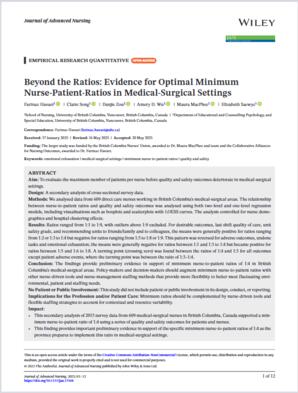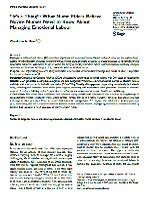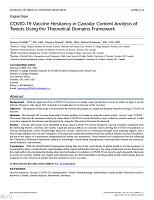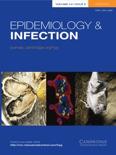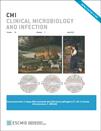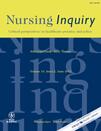Health Sciences
Related Works
Content type
Digital Document
Description / Synopsis
Advancements in genomics contribute to enhanced disease prevention, diagnosis and treatment. A skilled nursing workforce can ensure patients access safe and equitable genomics-informed healthcare. Policy and professional practice infrastructure are required to support Canada’s nursing workforce in integrating genomics into nursing practice. A coordinated and harmonized national approach is required to accelerate genomics into nursing.
Origin Information
Content type
Digital Document
Description / Synopsis
Nurses can make a significant contribution to genomics services. Policy infrastructure can guide education and leadership to assist nurses to participate in designing new roles and care pathways that address patients' identified needs in the precision oncology era.
Conference poster delivered at <a href="https://icncongress.org/event/220"> International Council of Nurses (ICN) Congress, Helsinki, Finland (June 9-13, 2025).</a>
Origin Information
Content type
Digital Document
Abstract
Aim: To evaluate the maximum number of patients per nurse before quality and safety outcomes deteriorate in medical-surgical settings.
Design: A secondary analysis of cross-sectional survey data.
Conclusion: The findings provide preliminary evidence in support of minimum nurse-to-patient ratios of 1:4 in British Columbia's medical-surgical areas. Policy-makers and decision-makers should augment minimum nurse-to-patient ratios with other nurse-driven tools and nurse-management staffing methods that provide more flexibility to better meet fluctuating environmental, patient and staffing needs.
No patient or public involvement: This study did not include patient or public involvement in its design, conduct, or reporting.
Origin Information
Content type
Digital Document
Abstract
Background
Emotional labour (EL) can take a significant toll on nurses’ mental health and well-being and has serious implications for the retention of nurses in the workforce. Nurse educators have struggled to prepare novices to manage EL or find serviceable resources with which to do so within the body of nursing literature, which is dominated by essentially unhelpful narratives and is absent of the practical, real-world wisdom of elder nurses.
Purpose
This exploratory research study illuminated elder nurses’ experiential knowledge and beliefs of what is important for novices to learn about EL.
Methods
Conventional Content Analysis (CCA) of qualitative survey data from 688 nurses with 20+ years of experience.
Results
CCA generated descriptive categories and sub-categories: What the elders themselves learned as student nurses, and their advice to novices in the individual realm, (“It's a Thing,” healthy disengagement, supporting mental and physical well-being, reframing self-reproach), team realm (peer support, mentors), and institutional realm (structural barriers to mentors’ support of novices, building novices’ capacities for self-advocacy, resources to support health and well-being).
Conclusions
The elders’ data confronted and reframed legacy individuated narratives in the literature by supporting and contextualizing nurses’ emotional work. Elders advised novices that EL is a reality requiring concrete strategies to manage it throughout their practices. Elders extended their focus for management of EL beyond the individual to include peer support, mentorship, and the structural conditions in which nurses perform their EL, highlighting the need to empower nurses by building their capacity for self-advocacy of their workers’ rights.
Origin Information
Content type
Digital Document
Abstract
Over the last decade, there has been an increase in the number of health care consumers (ie, patients, citizens, and laypeople) with access to their laboratory results through portals. However, many portals are not designed with the consumer in mind, which can limit communication effectiveness and consumer empowerment. We aimed to study design facilitators and barriers affecting consumer use of a laboratory results portal. We sought to identify modifiable design attributes to inform future interface specifications and improve patient safety. A web-based questionnaire with open- and closed-ended items was distributed to consumers in British Columbia, Canada. Open-ended items with affinity diagramming and closed-ended questions with descriptive statistics were analyzed.
Participants (N=30) preferred reviewing their laboratory results through portals rather than waiting to see their provider. However, respondents were critical of the interface design (ie, interface usability, information completeness, and display clarity). Scores suggest there are display issues impacting communication that require urgent attention. There are modifiable usability, content, and display issues associated with laboratory results portals that, if addressed, could arguably improve communication effectiveness, patient empowerment, and health care safety.
Origin Information
Content type
Digital Document
Abstract
Background: With the approval of two COVID-19 vaccines in Canada, many people feel a sense of relief, as hope is on the horizon. However, only about 75% of people in Canada plan to receive one of the vaccines. The purpose of this study is to determine the reasons why people in Canada feel hesitant toward receiving a COVID-19 vaccine. Methods: We screened 3915 tweets from public Twitter profiles in Canada by using the search words “vaccine” and “COVID.” The tweets that met the inclusion criteria (i.e., those about COVID-19 vaccine hesitancy) were coded via content analysis. Codes were then organized into themes and interpreted by using the Theoretical Domains Framework. Results: Overall, 605 tweets were identified as those about COVID-19 vaccine hesitancy. Vaccine hesitancy stemmed from the following themes: concerns over safety, suspicion about political or economic forces driving the COVID-19 pandemic or vaccine development, a lack of knowledge about the vaccine, antivaccine or confusing messages from authority figures, and a lack of legal liability from vaccine companies. This study also examined mistrust toward the medical industry not due to hesitancy, but due to the legacy of communities marginalized by health care institutions. These themes were categorized into the following five Theoretical Domains Framework constructs: knowledge, beliefs about consequences, environmental context and resources, social influence, and emotion.
Conclusions
With the World Health Organization stating that one of the worst threats to global health is vaccine hesitancy, it is important to have a comprehensive understanding of the reasons behind this reluctance. By using a behavioral science framework, this study adds to the emerging knowledge about vaccine hesitancy in relation to COVID-19 vaccines by analyzing public discourse in tweets in real time. Health care leaders and clinicians may use this knowledge to develop public health interventions that are responsive to the concerns of people who are hesitant to receive vaccines.
Origin Information
Content type
Digital Document
Abstract
Although community-onset bloodstream infection (BSI) is recognized as a major cause of morbidity and mortality, its epidemiology has not been well defined in non-selected populations. We conducted population-based surveillance in the Interior Health West region of British Columbia, Canada in order to determine the burden associated with community-onset BSI. A total of 1088 episodes were identified for an overall annual incidence of 117·8/100 000 of which 639 (58·7%) were healthcare-associated (HA) and 449 (41·3%) were community-associated (CA) BSIs for incidences of 69·2 and 48·6/100 000, respectively. The incidence of community-onset BSI varied by age and gender and elderly males were at the highest risk. Overall 964 (88·6%) episodes resulted in hospital admission for a median length of stay of 8 days; the total days of acute hospitalization associated with community-onset BSI was 13 530 days or 1465 days/100 000 population per year. The in-hospital mortality rate was 10·6% (102/964) and this was higher for HA-BSI (72/569, 12·7%) compared to CA-BSI (30/395, 7·6%, P = 0·014) episodes. Community-onset BSI, especially HA-BSI, is associated with a major burden of illness.
Origin Information
Content type
Digital Document
Abstract
Objectives
Diagnosis of a bloodstream infection (BSI) requires a positive blood culture. However, low culturing rates will underestimate the true incidence of BSI and high rates may increase the risk of false-positive results. We sought to investigate the relationship between culturing rates and the incidence of BSI at the population level.
Methods
Population-based surveillance was conducted in the western interior of British Columbia, Canada, between 1 April 2010 and 31 March 2017.
Results
Among 60 243 blood culture sets drawn, 5591 isolates were obtained, of which 2303 were incident, 1929 were repeat positive and 1359 were contaminants. Overall annual rates of culturing, incident, repeat positive and contaminant isolates were 4832, 185, 155 and 109 per 100 000 population, respectively. During the 84-month study, there was an increase in the culturing rate that reached a plateau at 48 months (5403 cultures per 100 000 per year). The rate of both repeat isolates and contaminants increased linearly with an increasing culturing rate. However, the incident isolate rate reached an inflection point at a rate of approximately 5550 per 100 000 annually, at which point the increase in incident isolates per culture sample was diminished. At a culturing rate above 6123 per 100 000 per year, the number of repeat isolates exceeded that of incident isolates.
Conclusions
The determined incidence of BSI will increase with increased culturing in a population. Further studies are needed to explore optimal BSI culturing rates in other populations.
Origin Information
Content type
Digital Document
Abstract
Acetaminophen is a widely used analgesic that can cause acute liver failure when consumed above a maximum daily dose. Certain patients may be at increased risk of hepatocellular damage even at conventional therapeutic doses. We report a case of a 34-year-old man on carbamazepine for complex partial seizures who developed acute liver and renal failure on less than 2.5 grams a day of acetaminophen. This raises caution that patients on carbamazepine should avoid chronic use of acetaminophen, and if required use at lower doses with vigilant monitoring for signs of liver damage.
Origin Information
Content type
Digital Document
Abstract
Problematic substance use (PSU) among nurses has wide‐ranging adverse implications. A critical integrative literature review was conducted with an emphasis on building knowledge regarding the influence of structural factors within nurses' professional environments on nurses with PSU. Five thematic categories emerged: (i) access, (ii) stress, and (iii) attitudes as contributory factors, (iv) treatment policies for nurses with PSU, and (v) the culture of the nursing profession. Conclusions were that an overemphasis on individual culpability and failing predominates in the literature and that crucial knowledge gaps exist regarding the influence of structural factors on driving and shaping nurses' substance use. [ABSTRACT FROM AUTHOR]
Origin Information



